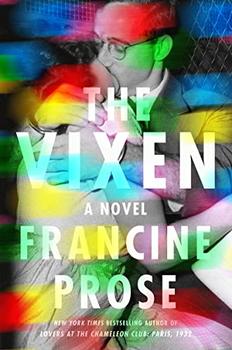Summary | Excerpt | Reviews | Beyond the Book | Readalikes | Genres & Themes | Author Bio

Chapter 1
In the winter of 1954, I was assigned to edit a novel, The Vixen, the Patriot, and the Fanatic, a steamy bodice-ripper based on the Rosenberg case.
The previous year, Ethel and Julius Rosenberg were executed for allegedly selling atomic secrets to the Russians. The horror of the electric chair and the chance that the couple were innocent had ignited outrage in this country and abroad. Protestors took to the streets in sympathy for the sweet-faced housewife whose only crime may have been typing a document for her brother, David Greenglass.
But according to the manuscript that landed on my desk, the Rosenbergs (in the novel, the Rosensteins) were Communist traitors, guilty of espionage and treason, eager to soak their hands in the blood of the millions who would die because of their crime.
The Vixen, the Patriot, and the Fanatic, Anya Partridge's debut novel, portrayed the Rosensteins as cold-blooded spies, masterminding a vast conspiracy to destroy the American way of life. Esther Rosenstein was a calculating seductress, an amoral Mata Hari who used her beauty and her irresistible sex appeal to dominate her impotent husband and lure a string of powerful men into putting the free world at risk of nuclear Armageddon.
It was strange that I, of all the young editors in New York, should have been chosen to work on that book. My mother grew up on the Lower East Side, in the same tenement building as Ethel—Ethel Greenglass then. They went to the same high school. They hadn't been close, but history had turned Ethel, in my mother's eyes, into a beloved friend, almost a family member, the victim of a state-sanctioned public murder. Perhaps my mother's sympathy was unconsciously spiked by our natural human desire for proximity to the famous.
My being assigned The Vixen was, I thought, pure coincidence.
No one at work knew about the family connection. The only person who bridged the distant worlds of home and office was my uncle Madison Putnam, the distinguished literary critic and public intellectual, who had used his influence to arrange my job. If he knew that his sister-in-law had been Ethel's neighbor and classmate, he would never have said so.
Joseph McCarthy, the senator from Wisconsin, was still conducting investigations, accusing people of being Communists plotting to destroy our freedom. There were no trials, only hearings. McCarthy was the prosecutor, judge, and jury. To be accused was to be convicted. Once you appeared before the committee, your friends and coworkers shunned you. Most likely you lost your job. There were betrayals, divorces, suicides, early deaths brought on by panic about the future. Refusing to cooperate with the investigation could mean contempt citations and prison. The cooperating witnesses who agreed to "name names" were despised by their more courageous and principled colleagues.
You didn't mention someone you knew in the same sentence as a Russian spy. You definitely didn't admit that your mother or wife or sister-in-law grew up with the woman who committed the Crime of the Century. Those were not the celebrities whose names anyone dropped, not unless you wanted the FBI knocking on your door. If someone found out that Mom had known Ethel, my father could have been fired from his job managing the sporting goods store, and Mom would likely have been barred from going back to teaching when the doctors cured her migraines.
A tawdry romance loosely based on the Rosenberg case, The Vixen, the Patriot, and the Fanatic was intended to be an international bestseller. It was not the sort of book that would normally ever appear under the imprint of the distinguished firm of Landry, Landry and Bartlett.
Landry, Landry and Bartlett published literary fiction, historical biographies, and poetry collections, mostly by established poets. The company was founded just after the Second World War, though it seemed to have been fashioned after an older, more venerable model: a long-established family firm. Since the retirement of its ailing cofounder Preston Bartlett III, one heard rumors—whispers, really—that its finances were shaky and its future uncertain, rumors that my uncle seemed delighted to pass on.
Excerpted from The Vixen by Francine Prose. Copyright © 2021 by Francine Prose. Excerpted by permission of Harper. All rights reserved. No part of this excerpt may be reproduced or reprinted without permission in writing from the publisher.
If every country had to write a book about elephants...
Click Here to find out who said this, as well as discovering other famous literary quotes!
Your guide toexceptional books
BookBrowse seeks out and recommends the best in contemporary fiction and nonfiction—books that not only engage and entertain but also deepen our understanding of ourselves and the world around us.